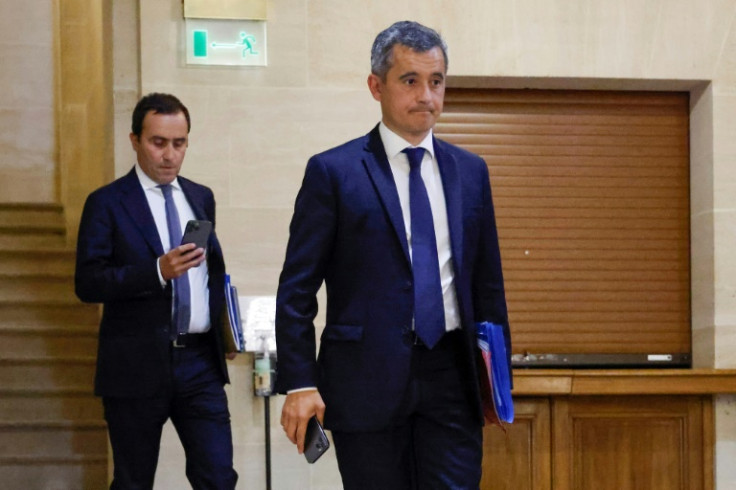French Police Probing Death During Marseille Riots

French authorities on Wednesday probed the death of a man who may have been hit by a police rubber bullet during riots in Marseille, as the country counted the cost of its most intense urban violence in nearly two decades.
Prosecutors in Marseille, a southern port wracked by some of the worst clashes over the weekend, said a 27-year-old man riding a scooter had been found dead overnight Saturday to Sunday and was believed to have suffered a heart attack.
Prosecutor Dominique Laurens said he had opened an investigation into "a death involving the use of a weapon", with the victim suffering a "violent shock" that appeared to be consistent with a projectile known as a "flashball".
If confirmed, the death would be the first reported during the week-long riots, which were sparked by the fatal police shooting of a 17-year-old teenager of North African origin during a traffic stop in a suburb west of Paris last Tuesday.
Overnight on Tuesday-Wednesday, another 45,000 security forces were deployed nationwide, with the interior ministry reporting the second mostly calm evening in a row.
There were only 16 arrests linked to public disorder nationwide -- compared with a peak of 1,300 in a single night on Friday-Saturday.
Interior Minister Gerald Darmanin updated senators on the destruction carried out by often teenage mobs in deprived, multi-ethnic areas of French cities where many people complain about racism and discrimination.
Around 23,000 fires had been lit on public streets, 273 buildings belonging to the security forces had been damaged, along with 168 schools and 105 offices used by mayors. he said.
More than 3,500 people had been arrested, with their average age being 17.
"We can see calm returning nationwide but remain very alert for the coming hours and days," Darmanin said.
With the violence all but ended, a divisive political debate is now raging about the reasons for the mass targeting of police and other symbols of the French state.
Most opposition right-wing politicians have concluded it is the result of the government losing its grip in poor areas, dismissing suggestions that racism, poverty or police brutality could explain the anger and resentment.
Far-right parties have linked the most intense and widespread riots since 2005 to mass migration, calling for curbs on the number of new arrivals in France.
Bruno Retailleau, who heads the opposition Republicans party in the Senate, sparked an outcry Wednesday when he suggested rioters from immigrant backgrounds had undergone "a regression to their ethnic roots".
The comments from such a prominent mainstream conservative underscored the increasingly shrill debate about immigration and identity in France where far-right politicians such as Marine Le Pen are at historic highs in the polls.
Around 90 percent of those arrested during the riots were French nationals, according to interior ministry figures.
The parliamentary head of the hard-left France Unbowed party, Mathilde Panot, denounced Retailleau's "crass racism".
Anti-Islam media commentator Eric Zemmour, who ran unsuccessfully for president last April, has likened the riots to an "ethnic war", while Le Pen has accused the centrist government of transforming "one of the most courteous, elegant and gentle countries on Earth into a hell."
Darmanin, a right-winger in Macron's centrist cabinet, told senators Wednesday that when he visited police stations during the riots and checked the names of detainees, "there were lots of Kevins too", referring to a name popular among the white working class.
"The explanation based on identity seems mistaken to me," he added.
Macron, who chaired a cabinet meeting on Wednesday, also sparked controversy by suggesting the country needed tools to "cut off" social media in the future.
"When things get out of control, we might need to be able to regulate or cut (social networks) off," Macron said, according to media reports.
He and his ministers have singled out platforms like Snapchat, TikTok and encrypted messenger Telegram for their role in helping organise and spread images of the violence.
"This is worrying, when we reach the point of saying the only solution is cutting off social networks," Greens leader Marine Tondelier told broadcaster France Inter on Wednesday.
The government wanted to bring together a cross-party group of lawmakers to discuss new legislation to regulate social networks, government spokesman Olivier Veran clarified on Wednesday.
A working group would examine possible "legal tools" and "precisions" that could be added, he told reporters.
"That could mean suspending features... for example some platforms have geolocation features allowing young people to meet at a certain spot, showing (violent) scenes and how to start fires," Veran said.

© Copyright AFP 2024. All rights reserved.



















